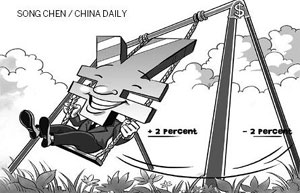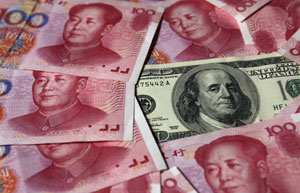The latest 2 percent range does not mean China has set up a fully marketized exchange rate formation for its currency. The increase of 1 percent embodies the "active, controllable and gradual" principle China's central bank has adopted in its push for the reform of the yuan's exchange rate formation mechanism. As a central bank spokesman put it, the latest extending of the range may mean some short-term pain for companies as they deal with more market risks, but it will increase their competitiveness in the long run. The central bank's move had been signaled prior to it being made, and the recent drastic depreciations of the yuan reflect a high degree of market sensitivity toward the move.
Despite such an expanded fluctuation range, China's central bank still imposes more limitations on the range of the yuan's daily trading against the dollar than against other foreign currencies. Currently, a 3 percent rise or fall is allowed for the yuan's daily exchange rate fluctuations against the euro, the pound, the Japanese yen and the Hong Kong dollar while a 5 percent range is allowed for the yuan's fluctuation against Russian rubles and the Malaysian ringgit.
The harsher restrictions on the yuan's daily fluctuations against the dollar, the major currency of China's foreign reserves, are to prevent any large fluctuations having an excessive influence on the Chinese economy.
The central bank will watch and analyze the effect of the new range. During this period, the central authorities will be unlikely to exercise market interventions into the yuan's foreign exchange market and there is not much possibility for either one-way appreciation or depreciation of the yuan. Such two-way exchange rate fluctuations of the yuan will bring new tests to domestic exporters, but they need to adjust and deal with a more market-based exchange rate.
The central bank will continue to push for further liberalization of the yuan's exchange rate and will diversify the foreign exchange holdings to hedge against risks as it builds a market-guided and properly regulated floating exchange system.
The author is a Shanghai-based economics commentator.
|
 |
 |
